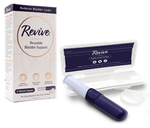September 18, 2019
When Should I Talk to My Doctor About My Leaks?
For a lot of adults, we avoid seeing the doctor if we can. Taking time off of work and rearranging your day just for a quick check-up or to ask a question about our own health is such a hassle, especially for something as embarrassing and trivial as light bladder leaks! While the occasional leak doesn’t feel like it warrants a trip to your physician, talking with your doctor can ensure nothing more is happening and that you’re taking the best steps to help improve your quality of life.

Find the Right Diagnoses
Some women may have resigned to accepting that accidentally leaking every once in a while is just another sign of aging. While it is true that older women do experience more leaks as they age, it’s important to tell your doctor what you’re going through and be descriptive in your experiences. Any details that may seem trivial to you could change the way your doctor looks at your symptoms and ultimately impact the final diagnoses and how to approach a solution. While it may seem that all leaks are the same, there is actually a difference between SUI and a problem called Urge Incontinence. While both end in involuntary leaks, the characteristics of the triggers, causes, and leaks themselves are different and it is important for your doctor to make the distinction. Urge Incontinence - The sudden, intense urge to urinate followed by an involuntary loss of urine. Women that have UI often have to go in the night and more frequently. Oftentimes, UI is linked to an infection like a UTI and treating the main cause will help reduce leaks. Stress Incontinence - Caused by the weakening of pelvic floor muscles and surrounding tissue. This can be a result of childbirth, surgery, repeated impact over time, or even age. Leaks occur because the muscles that are damaged can no longer effectively seal and regulate the flow of urine whenever the urinary tract, abdomen, or bladder is put under pressure or stress. The pressure that triggers these leaks can be very small - a sneeze, laugh, or cough is enough stress to cause a leak. As mentioned before, it is important to be descriptive in your symptoms when explaining them to your doctor, no matter how small or trivial the details may seem. If you notice any of these symptoms start to develop alongside your leaks, make sure to let your doctor know:- Bleeding
- Muscle pain or cramps
- Burning sensation with urination
- The leaks become increasingly heavier and more frequent
Finding the Right Solutions
The biggest benefit of being open and honest with your doctor about your incontinence symptoms is that together you’re able to work out the best solution for you and your lifestyle. Your physician will be able to go over what your options are and the benefits of each. If you’re experiencing urge incontinence as a symptom of another problem, obviously going to a doctor to diagnose and treat the problem will reduce your leaks. In the case of SUI, however, there are several options for women to choose from: Healthier Lifestyle Choices - Smokers and overweight or obese people develop stress incontinence more than those living a healthier lifestyle. Your doctor is ALWAYS going to suggest that you watch your weight, don’t smoke, and be active for general health, but they may contribute these factors to your bladder leaks, as well, and these suggestions could be your potential solution. Pads and Liners - These products are available at drugstores and chain stores like Wal-Mart and Target nationwide, making them available to almost every woman. Meant to be worn like a menstrual pad in the underwear to soak up leaks and keep you dry. While convenient, pads and liners can be uncomfortable, bulky and indiscrete, and can only be worn for a certain amount of time before the chances of odor or infection are increased. Kegels - These are exercises meant to target the weakened or damaged pelvic floor muscles and strengthen them. Your doctor may suggest these exercises in conjunction with another product or treatment as it can take weeks or months for results to be seen or felt. Ask your doctor how to do them correctly, and let them know if you feel pain or discomfort when doing them.Revive™
Beyond the above solutions that you and your doctor may discuss, another solution exists for women over-the-counter. Revive™ is a reusable bladder support device for women to help reduce leaks for up to 12 hours a day. The simple and effective design is comfortable and easy to use with no sizing or placement assistance from a healthcare professional. In clinical studies, 71% or women experienced a reduction in leaks and reported feeling dry 75% of the time, and 90% said that the device was a good fit upon first use. Revive is available at retailers nationwide!


